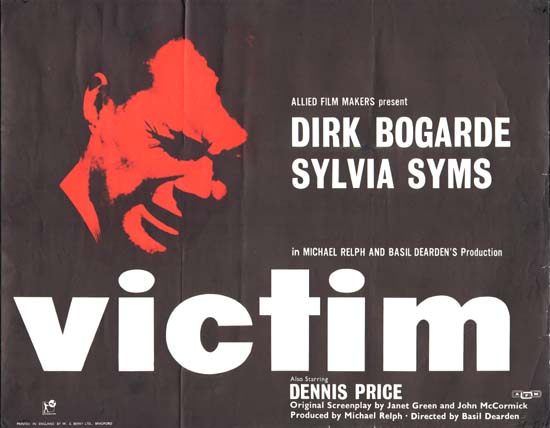
VICTIM
UK, 1960, 100 minutes, Black and white.
Dirk Bogarde, Sylvia Syms, Dennis Price, Peter Mc Enery, Derryn Nesbitt.
Directed by Basil Dearden.
Victim must have created a stir when first released in the early sixties. It is a well done British blackmail thriller, made by the team of producer, Michael Relph and director, Basil Dearden (The Gentle Gunman; Woman of Straw; The Assassination Bureau) and starring Dirk Bogarde at his most polished and sympathetic.
The reason for blackmail is homosexuality and the film presents a sympathetic case for the men who are victims of this kind of extortion - where the alternatives are exposure, loss of reputation and work or prison term. The film presents most of the varying opinions on homosexuality in the screenplay. At times these are forced and the film is obviously pleading a cause for law reform, taking the legislation out of the field of private morals in this instance. Public lack of understanding of the plight of the homosexual was still prevalent by 1960 and the film raises its questions in interesting story form that would make people reflect on their opinions. Although Britain has changed its laws, the issues are still worthy of discussion.
Other films which deal with this question and (with warning about their theme as some are quite frank) are worth seeing and discussing - The Loudest Whisper (Audrey Hepburn and Shirley Mac Laine); The Killing of Sister George (Beryl Reid and Susannah York); The Sergeant (Rod Steiger and John Phillip Law); Staircase (Richard Burton and Rex Harrison). Victim presents its case with feeling but also with British reserve and understatement.
1. Was this a propaganda film? If so, what was the cause it was espousing? Did it present its case convincingly? Did it detract from the film as an entertaining and interesting story?
2. Comment on the build up of suspense - curiosity aroused about Barrett. How did Barrett affect Harold the bookseller, Farr, Cavendish the car man, Frank and his wife, Eddie?
3. How did the film show the anguish of the homosexual by focussing on the victim's faces?
4. What was your reaction to the information that 90% of blackmailing cases concerned homosexuals?
5. In the cases of adults in private is the law fair to come into the field of private morals?
6. Many of the characters mouthed the varying points of view on law reform. What points of view were put forward?
7. Why did Farr refuse to see Barrett?
8. Should Farr's wife have stayed with him or not? Were her reactions reasonable?
9. What kind of people were the blackmailers - the blind man and his friend, the young man on the bike, the puritanical spinster? Cavendish?
10. What was Farr risking in pursuing the blackmailers? Did he realise the extent of his sacrifice and humiliation? Was he right to proceed?
11. Did this film help you to understand human nature better? Did it help you to sympathise with people who suffer? Did if affect your attitudes to the role of law in people's lives?
12. Consider the varying points of view on Law Reform: too many excuses made for the lower part of human nature (the barman); public opinion, scandal, hero-worship for the deviate can be disillusioning (Scott); change the law and the floodgates are opened; the motive can never mitigate the crime.